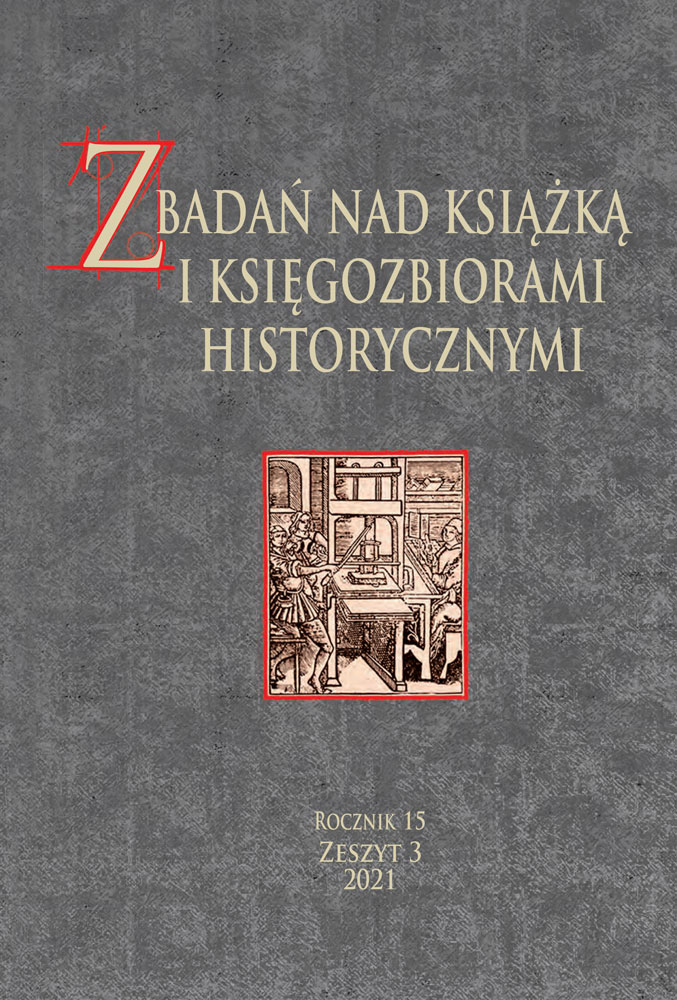The Reception and the Fear of Kant in the Late Eighteenth Century
DOI:
https://doi.org/10.33077/uw.25448730.zbkh.2021.679Słowa kluczowe:
Hungary – Kant Immanuel – 18th century – eighteenth century – censorship – history of philosophy – transfer of ideasAbstrakt
Hungary – Kant Immanuel – 18th century – eighteenth century – censorship – history of philosophy – transfer of ideas
Bibliografia
• Andreanský E., Kantova filozofia náboženstva z hľadiska praktickej racionality, “Filozo¬fia” 2012, Vol. 67, No. 3, pp. 195–207.
• Bachleitner N., Die literarische Zensur in Österreich von 1751 bis 1848, Wien-–Köln– Weimar 2017.
• Glatz J., Freymüthige Bemerkungen eines Ungars über sein Vaterland, Teutschland 1799.
• Golob A., Der Grazer Buchhandel und seine Beziehungen zu den ungarischen Länder um 1800. Ein Überblick auf der Grundlage von Anzeigen in Grazen Zeitungen, “Magyar Könyvszemle” 2010, Vol. 126, No. 1, p. 80–99.
• Heinicke S., Wörterbuch zur Kritik der reinen Vernunft und zu den philosophischen Schri¬ften von Herrn Kant, Presburg 1788.
• Inscriptiones Alborum Amicorum, [online] http://iaa.bibl.u-szeged.hu/index.php?pa-ge=browse&entry_id=10604 [30/04/2021].
• Jakob L.H. von, Über den moralischen Beweis für das Dasein Gottes, Liebau 1791.
• Karlovský Ž., Epitaphium in obitum Imanuelis Kanti, “Musenalmanach für das österre¬ichische Kaiserthum” 1808, Vol. 1, pp. 71–72.
• Kollárová I., Freier Verleger, denkender Leser: das typografische Medium in josephini¬scher Zeit, Gera 2017.
• Kollárová I., Historická pamäť v pamätníkoch, “Pamiatky a Múzeá” 2015, Vol. 64, No. 4, pp. 25–26.
• Kollárová I., Freedom of the Press in Hungarian Late Enlightenment Discourse, “Histo¬rický časopis”, 2016, Vol. 64, No. 5, pp. 785–808.
• Kollárová I., The secret book trade after the outbreak of the Great French Revolution. Symptoms of the latent history of communication, “Historický Časopis” 2018, Vol. 66, No. 5, pp. 815–848.
• Kollárová I., Tajne: nebezpečná myšlienka a netransparentnosť komunikačných sietí v čase nepokoja (1789–1799), Bratislava 2020.
• Kowalská E., Kantek K., Uhorská rapsódia alebo tragický príbeh osvietenca Jozefa Haj¬nóczyho, Bratislava 2008.
• Mészáros O., Dejiny maďarskej filozofie, Bratislava 2013.
• Mészáros O., Prvý verejný spor v maďarskej filozofii: spor o Kantovu filozofiu na prelome 18. a 19. storočia, “Filozofia” 2010, Vol. 65, No. 10, pp. 968–972.
• Mészáros O., Školská filozofia v bývalom hornom Uhorsku, Bratislava 2008.
• Münz T., Filozofia slovenského osvietenstva, Bratislava 1961.
• Oravcová M., Štefan Tichý – prvý stúpenec Kanta na Slovensku, “Filozofia” 1986, Vol. 41, No. 5, pp. 588–602.
• Rozgonyi J., Dubia de initiis Transcendentalis Idealismi Kantiani, Pest 1792.
• Storr G.Ch., Annotationes quaedam theologicae ad philosophicam Kanti, Tubingae 1793.
• Tichý Š., Philosophische Bemerkungen über das Studienwesen in Ungarn, Pest-Ofen-Kas¬chau 1792.
• Tinková D., Jakobíni v sutaně: neklidní kněží, strach z revoluce a konec osvícenství na Moravě, Praha 2011.
• Umwege: Annäherungen an Immanuel Kant in Wien, in Österreich und in Osteuropa, ed. V.L. Waibel, Wien 2015.
• Verpönt, Verdrängt – Vergessen?, [online] http://www.univie.ac.at/censorship/info.html [accessed 30.04.2021].
• Zákutná S., The Reception and Criticism of Kant´s Philosophy in the Region of Today´s Slovakia at the Turn of the 18th Century and in the First Half of the 19th Century, [in:] Kant und seine Kritiker – Kant and his Critics, ed. A. Falduto, H.F. Klemme, Hildesheim–Zürich–New York 2018, pp. 236–237.
• Zákutná S., Stephan Tichy on Incorporating Kant´s Philosophy into University Education at the End of the 18th Century, ”Contextos Kantianos” 2016, No. 4, pp. 138–146.






